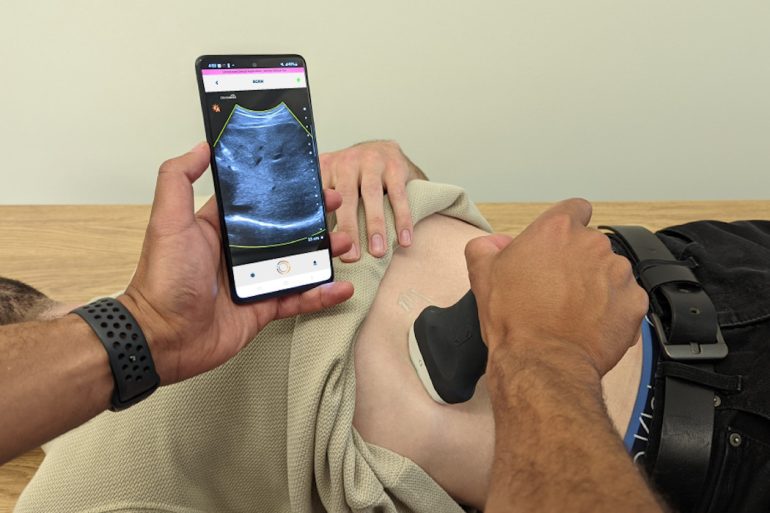Oncoustics has raised about $5.5 million CAD ($4.3 million USD) in seed funding to disrupt liver care by facilitating easier early disease detection, diagnosis, and patient management.
The Toronto and San Francisco-based startup is developing a hardware-agnostic, artificial intelligence (AI)-powered software platform designed to turn existing ultrasound devices into more powerful and efficient point-of-care diagnostic tools for liver disease and other diseases “with high unmet clinical need.”
“They’re basically creating a ‘virtual biopsy’ that has vast applications in healthcare.”
-James Wang, Creative Ventures
The growing handheld, ultrasound medical device market currently features manufacturers ranging from big players like GE and Philips to emerging upstarts like Butterfly Network and Exo. But according to Oncoustics CEO Beth Rogozinski, these devices are “not typically used” in radiology. “They’re really intended to be deployed at primary care, emergency departments, [or] in the lab because the image quality is so low,” Rogozinski told BetaKit in an interview.
Enter Oncoustics. Led by a team of AI, radiology, and digital health experts, Oncoustics applies machine learning (ML) to the raw sound signal produced by these ultrasound devices, in order to turn it into meaningful clinical data—specifically, tissue acoustic evaluations that enable the startup to do tissue characterization and spot disease.
By doing this, Oncoustics hopes to provide clinicians and patients with a less invasive, more cost-effective alternative to traditional biopsies that can be provided beyond just the hospital at point-of-care. A biopsy is a medical test that involves extracting sample cells or tissues from a patient for examination in order to determine the presence or extent of a disease.
“Our ultimate goal is to decrease or eliminate the need for high-end imaging or painful and invasive biopsies,” said Rogozinski.
Oncoustics’ all-equity seed financing was co-led by Creative Ventures and Saltagen Ventures, with participation from NorthSpring Capital Partners, Fraser Kearney Capital, Pallasite Ventures, and radiologist Dr. Chen Fong, who is joining the company’s board on behalf of Saltagen. To date, Oncoustics has raised over $5 million USD in total funding.
RELATED: Sonic Incytes raises $3.5 million seed round to commercialize liver health assessment device
Rogozinski described the raise as an “initial close,” noting that the startup is also currently in the process of raising an additional $1 million to $3 million USD in seed funding from strategic investors, likely in fall 2022.
Oncoustics was founded in 2018, and initially spun out of quantitative ultrasound imaging research conducted in 2014 by co-founder Ahmed El Kaffas at the Sunnybrook Research Institute, which is affiliated with the University of Toronto. After advising Oncoustics for a couple of years, Rogozinski, who previously served as CPO of another medtech firm in Boston-based Pear Therapeutics, joined as CEO in 2020.
While there are many different types of biopsies, the three common types include an incisional biopsy, an excisional biopsy, and a needle biopsy.
“The current needle biopsy for liver disease is like a 16-gauge needle and they do four cores of the liver,” said Rogozinski. “It’s like a big harpoon in your side.”
RELATED: Able Innovations announces $7.5 million to take the pain out of patient transfer
Oncoustics’ first product, the OnX liver assessment solution, is focused on detecting structural liver diseases, including fibrosis and steatosis, that can occur in all types of chronic liver disease. According to Rogozinski, there is “a tsunami of need around detecting these types of liver diseases.”
In addition to OnX, Oncoustics has several follow-on liver products currently in development. The startup has also amassed clinical data on a variety of other organ indications including prostate, kidney, breast, and thyroid diseases and cancers.
Oncoustics plans to use the seed funding to support the development of its products and fuel its work with the US Food and Drug Administration (FDA), among other things.
“Our ultimate goal is to decrease or eliminate the need for high-end imaging or painful and invasive biopsies.”
-Beth Rogozinski, Oncoustics
The company is currently awaiting a response from the FDA to run a clinical study, which it hopes to begin by November. Oncoustics is hoping to gain FDA clearance by the first half of 2023 and get its tech in the hands of clinicians by sometime early next year.
Creative Ventures partner James Wang described Oncoustics approach as unique. “They mine the raw data that is typically thrown away and can use this to go beyond what can be seen by the human eye,” said Wang, who is also joining the startup’s board as part of the round.
According to Fong, Oncoustics’ approach enables the startup to tap into raw data that is “much richer” than what is available in standard medical images. “This tool would make ultrasound much easier to use and would benefit millions of at-risk patients.”
Like Rogozinski, Wang sees potential beyond just liver disease. “They’re basically creating a ‘virtual biopsy’ that has vast applications in healthcare,” he said.
UPDATE (22/07/22): This story previously implied that the Sunnybrook Research Institute was owned or directed by the University of Toronto (U of T). It has since been updated to clarify that Sunnybrook is only affiliated with U of T.
Feature image courtesy Oncoustics.


